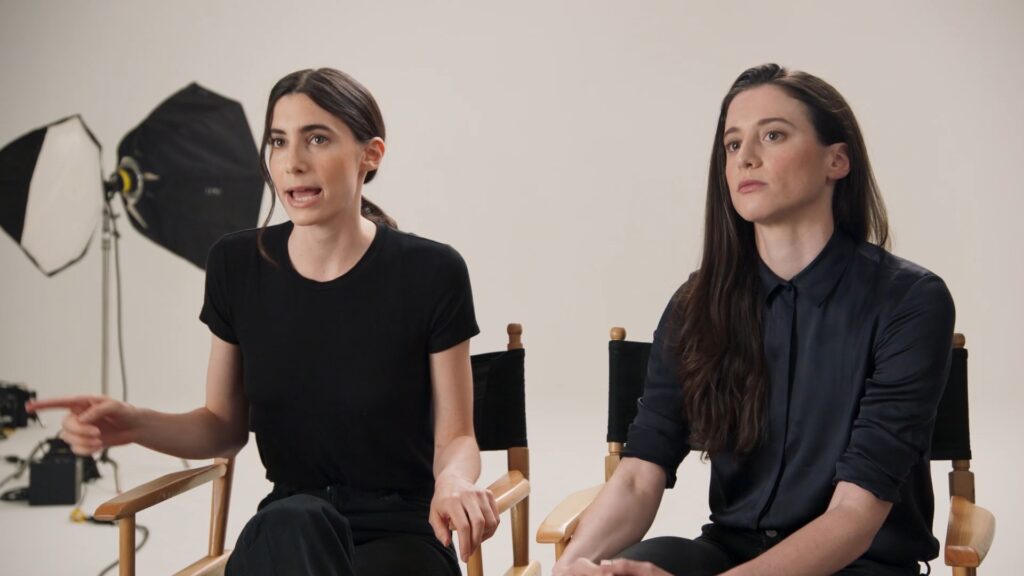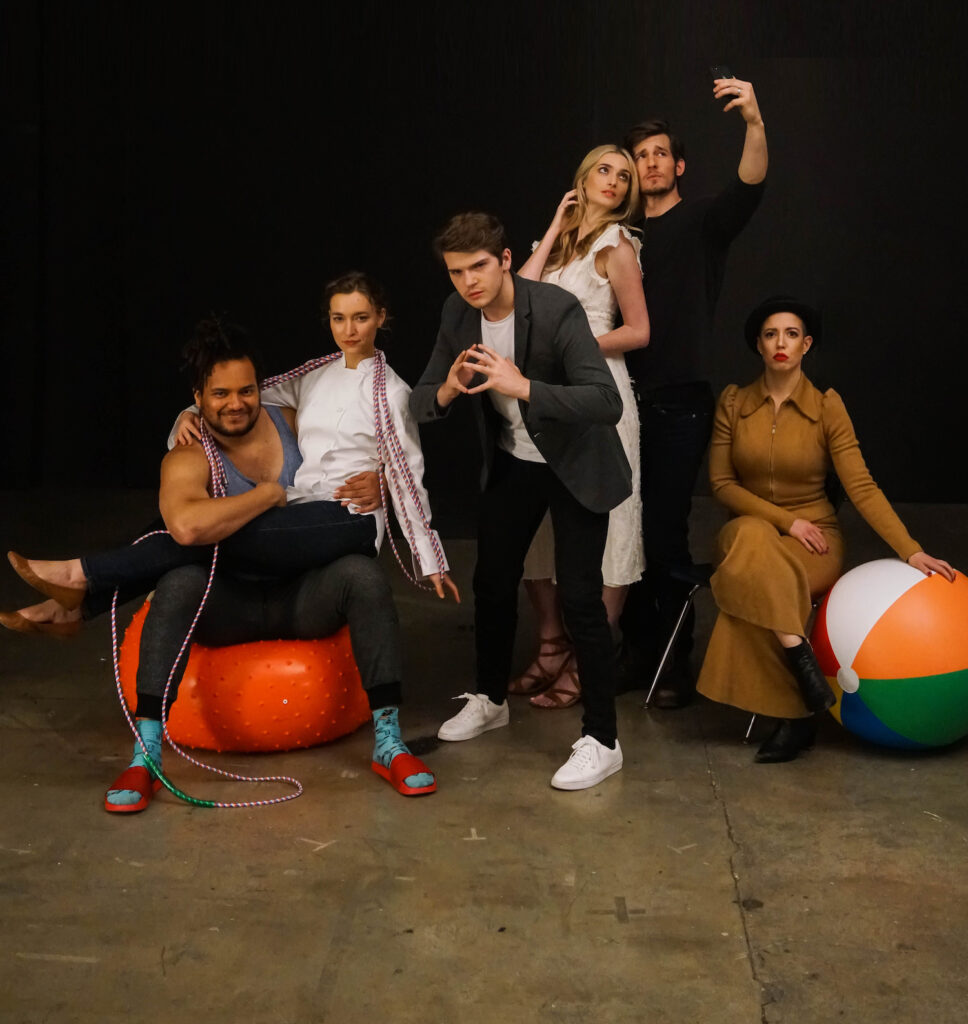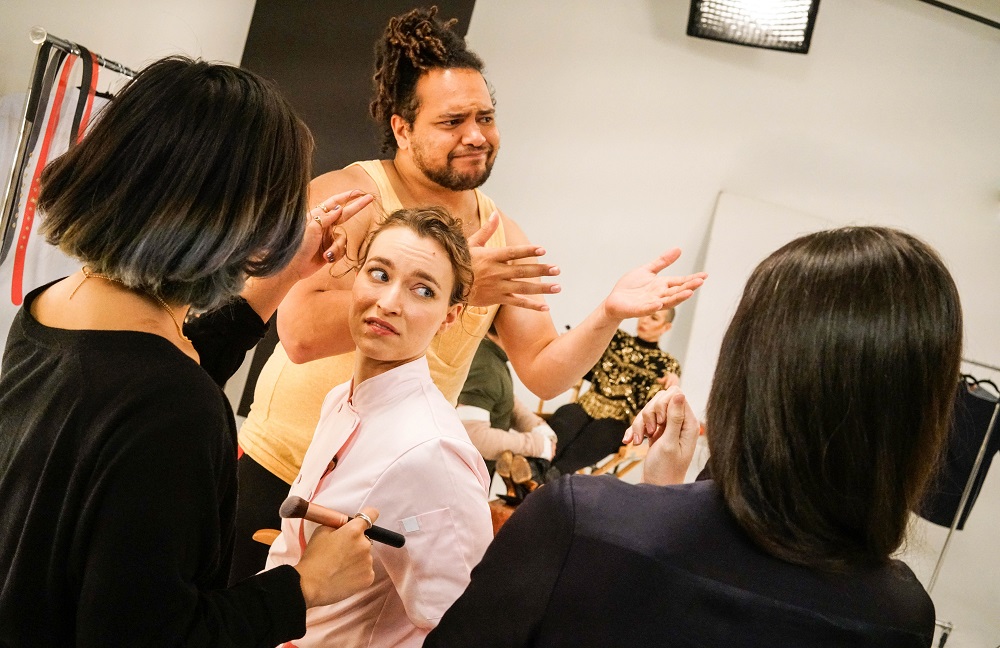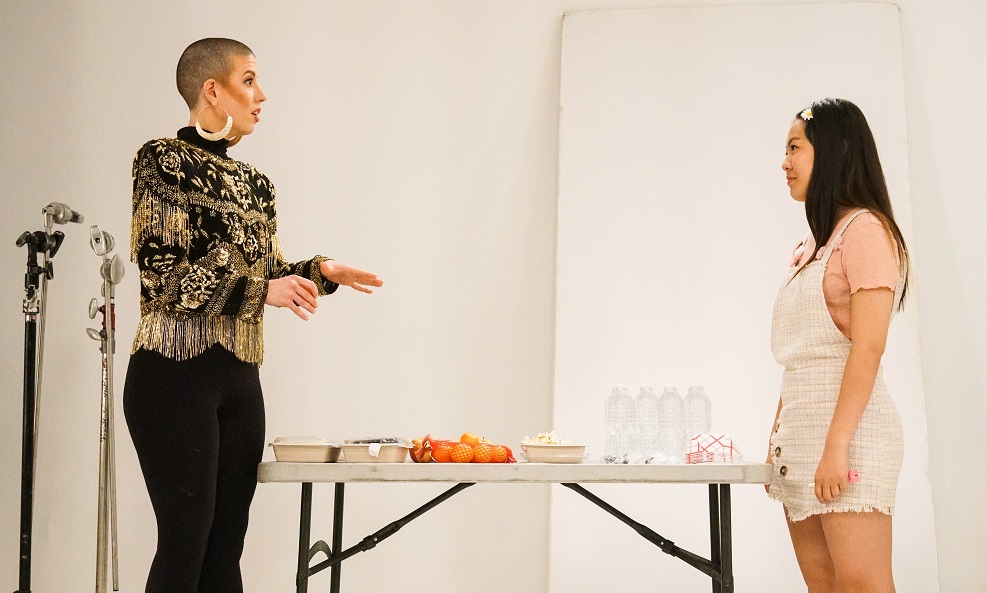The Social Ones, written and directed by Laura Kosann and co-produced by her sister Danielle, is a timely mockumentary exploring the lives and anxieties of a group of social media influencers. As they prepare for a big magazine cover shoot, we follow a Snapchat celebrity (Colton Ryan), an eccentric fashion blogger (Amanda Giobbi), a self-titled Meme God (Setareki Wainiqolo), a food Youtuber obsessed with cheese, eggs and rainbow-everything (Desi Domo), and a Facebook vlogger obsessed with playing dress-up with cute animals (Nicole Kang). Acting veterans Richard Kind, Debra Jo Rupp, Jackie Hoffman, Allegra Edwards and Stephanie March also star in this satirical comedy reflecting on a generation’s relationship to social media.

Outtake spoke with the co-creators and stars of The Social Ones, Laura and Danielle Kosann, about their careers so far, their newest film and their perspective on social media platforms.
How did you first get the idea for The Social Ones?
Laura: So, my sister and I started an online magazine called the New Potato about eight years ago and basically, we were finding that we were getting caught up in that content rat race of having an online magazine. And, you know, finding that one would do an interview with Robert De Niro, but then we would do an interview with someone on YouTube doing makeup tutorials and the YouTuber would get way more engagement than De Niro had.
And we really got caught up in what is kind of like a social media and content rat race, where you’re very much in this world of influencers. We were doing videos that I would write and direct that were just these comedic shorts but at some point, when we got very tired of it, I had this idea to write a mockumentary about this whole influencer concept. And the National Influencer is loosely based on our experiences at The New Potato. I was very inspired to write in this Christopher Guest style – because those were movies that I grew up with and I loved – documentary about social media influencers and that world.
You mentioned Christopher Guest, was that why you decided on doing a mockumentary style movie?
Laura: I thought it was a good format for this topic. I think, you know, I always loved those sorts of Christopher Guest movies where it really focused on these certain worlds. And I thought, how has someone not really made that about social media influencers? Because it’s such a funny sort of world that we all live in where a teenager doing stunts can have 15 million followers. I also thought it was a good format to show the influencers in these vignettes that are sort of Instagram-able, because that’s what the inside of their heads look like. So that’s also why I thought that it was a really good format for the topic, and also because I wanted to have this ensemble cast of characters where everyone can find a character to relate to. I think a mockumentary is such a good way to have a lot of really funny characters rather than straight narratives.

Speaking of the cast, you assembled an interesting mix of veteran actors and newcomers. How was the casting process?
Laura: It all kind of started when I showed Stephanie March the script. She’s a friend of ours, and she just really fell in love with it. And Steph has a nice friendship with Richard Kind, so that was able to happen and he also really loved the script; and what was great about Jackie [Hoffman] and Deborah [Jo Rupp] and Peter [Scolari] was that they were first choices for those parts. And we sent their agents the script and they loved it too and wanted to be part of it. And we had an amazing casting director Erica Hart basically had all these young people come in from Upright Citizens Brigade and the Pit, you know, these young comedians that are really talented. And we also scoured YouTube videos for these amazing young comedians who had like, 11 views on YouTube. But we were like, ‘some of these people are insanely talented.’
We really called everybody in, so the casting process was a lot of fun and really allowed us to get a great mix of people. And you know, I knew casting-wise that I wanted the veteran actors to be the characters trying to understand social media; that was the joke too, and Richard [Kind] says in so many interviews, ‘I didn’t even understand what half of my lines were’.
Did you have a clear idea of who the different characters were going to be? Or was there some collaboration once you’d cast them?
Laura: Yeah, it was definitely super collaborative. I always knew when I wrote it that I wanted to address the different niches, as I said, so you’ve got the viral chef, you’ve got the influencer couple whose relationship is based on how many followers each of them have, and you know, the fashion Instagram star. And what was great about these comedians was that after two weeks of being on script, I would say, ‘Okay, now let’s just play and get a few tapes where we just go wild with it’. And then it’s fun for them to be collaborative and really build their character.

And of course, you also play a role in your movie; why did you decide to cast yourselves as the editors of this magazine?
Danielle: Laura used to write and direct a lot of comedy shorts that we would do at New Potato, where we would play versions of ourselves and do this dead-pan back and forth. So when Laura originally wrote the screenplay, obviously it was based a lot on our experience from the New Potato. So we were like, ‘Okay, so we’ll just play Mia and Ava, because they’re kind of this version of ourselves’. And then of course, when we started casting all these incredible people, we had this moment of realisation where we were like, ‘Am I really going to be in a scene with Jackie Hoffman?’. But it worked out really well in the end.
In retrospect now, do you have any scenes that particularly stand out in terms of their narrative value?
Laura: Oh, that’s a really good question. Honestly, I really love the therapy scenes because I think that these fictional disorders – some of which are not so fictional – like social media anxiety disorder, so many people have it but it’s not diagnosed. Steph did such a good dead-pan job in the therapy scenes, particularly with the couple. I think they’re just so relatable, like ‘I’ve actually had that fight with my boyfriend!’. I think that those were really great.
Danielle: The Jackie Hoffman scene, she is so effortless with what little time she has. She just really nailed it.
Laura: And the scene of the magazine shoot was actually a really fun a special day. We just found ourselves with an extra half day and a space, and all those little vignettes with the Instagram star and the clementine, and the Meme God asking Jane Zap to get him a coffee, and the whole sequence with the ladder… All of that was stuff I wrote on the fly on set and just do, and it worked out. That was a favourite of mine because it just shows how collaborative it was, and being a small crew on a super indie movie, we were able to really be creative which was great.

And having done this movie now, has your attitude towards your own use of social media shifted or was it the other way around, where your view of social media influenced your concept of the movie?
Danielle: I think it was a combo of the two because when Laura wrote the movie, it really came from a place of us seeing how hooked we all were on social media and sort of poking fun at that, and highlighting the dangers of that. But then the irony of that is that when the movie came out, we are making fun of social media but we also want this to be all over social platforms. It’s sort of that push and pull, finding that balance between acknowledging we maybe spend too much time on social media and try to be healthier about it, but we also need social media especially now. of how we how we live with social media and how Yes, we don’t. We all say, Oh, God, well, we spend way too much time on social media and we try to be healthier about it, but we also need social media, especially right now.
Laura: It’s funny, Richard Kind just had an interview where he said that this movie is like a warning. A lot of my thinking on social media and my moving away from it was when I wrote this movie, because I did feel that there’s something funny about using social media as a way of avoiding human interaction. That’s a scary thought really. But obviously now is particularly interesting, in that social media environments are the only way to talk to others.
It’s interesting that you mentioned that, because a lot of the awareness regarding the relationship between mental health and social media is actually raised on those very platforms. Do you think it’s that easy to separate yourself from your online presence?
Danielle: I think no, and that’s why with the ending, the whole purpose of them doing those tech detox workshops is so they can put it all over social media. It’s like this scary hypocrisy because social media makes everyone into a brand. Whether you have five followers of five million, you still feel that pressure. So it’s not that there isn’t a difference between humans and handles, it’s more like an alternate universe that we spend 50% of our lives in.
And I think a lot of people need social media in their careers. It’s a rare type of person who can be off social media for a month and not have it change their lifestyle. We all have our different balance points to find. And it is like this beast you have to feed and it’s not a negative, but it is the case that the bigger a following you build up, the more responsibility you have to use that platform well.
The Social Ones is out on VOD now.
